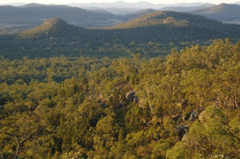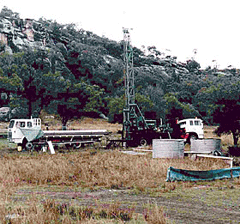Coal Controversy Down Under
Air Date: Week of January 26, 2007

Anvil Hill (Courtesy of Anvil Hill Alliance)
Exporting coal is big business in Australia. Mark Tamhane reports on the controversy surrounding a proposal to open a large open pit coal mine in the eastern part of the country. Opponents are seizing on a court ruling that says businesses must take into account the impact of their projects on climate change. This may not affect the plans for the pit mine but the coal industry is on edge about how the ruling will affect future coal projects.
Transcript
CURWOOD: A landmark legal judgment in Australia has thrown the country’s huge coal industry and many other major projects into uncertainty, thanks to growing concerns about climate change. A court in New South Wales, the most populous state in Australia, has ruled that business and industry must consider the global warming impact of large developments.
The case involves a new open-pit coal mine. And it’s all the more significant, as Australia is one of only two industrial nations—the other being the United States—that’s refused to ratify the Kyoto Treaty that imposes limits on greenhouse gases. Mark Tamhane reports from coal-rich Hunter Valley, north of Sydney.
[OCEAN SOUNDS SHIPS AND TUGS BLOWING THEIR HORNS]
TAMHANE: A huge bulk-carrier is escorted by three tugs into the port of Newcastle in eastern Australia. Within 36 hours the Panamanian registered ship will be putting out to sea again heading for the energy-hungry nations of Asia, loaded to the gunnels with Australian black coal.
WEBB: What we see to our right is the entrance to the port of Newcastle, that has been operating for over 200 years as a commercial port.
TAMHANE: Gary Webb is the Chief Executive of Newcastle Port Corporation – the largest coal gateway in the world.
WEBB: The first commercial export from this port was in 1797 --- it was fifty ton of coal to Bengal. Apparently it took about ten days to load. Times have changed enormously because directly upstream to our left we see, ah, major coal-loading facilities. Over 80 million ton of coal was exported from the port this year.

Anvil Hill (Courtesy of Anvil Hill Alliance)
ANVIL HILL: Approval by federal and state governments for Anvil Hill would see Australia, already the world's largest coal exporter, open another massive coal mine and export even more climate-changing coal.
WOMAN: The mining industry has gone berserk, if they would want to even consider mining an area like this.
TAMHANE: Community groups say open-pit mining at Anvil Hill would wipe out the last significant area of bush land on the floor of the Hunter Valley. It’s an important habitat for a number of endangered species, including Australia’s iconic koala and 14 varieties of birds, like the grey-crowned babbler.
Such complaints are increasingly heard in mining country around the world. What sets this opposition apart is an extraordinary decision for a state court here, prompted by a university student, a classics major.

Mining production at Anvil Hill. (Courtesy of Centennial Coal)
TAMHANE: 26-year old Peter Gray was half way through an Honors degree in Classics at Newcastle University when he decided to challenge the Environmental Impact Statement lodged by the developers of the Anvil Hill project. At first it seemed like the Barbarians taking on the power of Rome.
GRAY: A bit like that perhaps. Um, I hope the analogy holds good because they did end up sacking Rome...so. (laughs)
TAMHANE: Gray put forward what may be a first-of-its kind argument against a coal mine. He said the plans didn’t take into account the climate change effects when the coal from Anvil Hill would be burnt. Gray calculated the Environmental Impact Statement overlooked 25 million tons of future CO2 emissions each year. It didn’t matter that most of that coal would be burnt later or even overseas, because climate change, he argued, will hurt New South Wales. Justice Nicola Pain agreed well…sort of.
GRAY: It doesn’t mean a great deal for the Anvil Hill mine itself. Um, the judge declined to interfere with the approval process for the mine; however, what it does mean is that an assessment of the downstream impacts of the extraction of the coal and that is the combustion of the coal and the release of the CO2 emissions into the atmosphere, ah must be assessed in the environmental assessment process.
TAMHANE: Bob Cameron, the Chief Executive of Centennial Coal – the company that wants to mine Anvil Hill, claims the ruling will have little effect.
CAMERON: It’s a very neutral decision if anything it’s somewhat positive. Because the judge declined to send the process back to the starting point as the applicant had sought. She didn't impose any additional requirements -and in fact the Anvil Hill assessment process remains absolutely on track it has no practical implications for it whatsoever.
TAMHANE: But industry groups are quite worried by the precedent of calculating future greenhouse emissions. Nikki Williams, Chief Executive of the New South Wales Minerals Council.
WILLIAMS: There are three and a half million people employed in this state there are 300 thousand business owners and each one of those is going to be dramatically affected potentially, if this decision is taken to its logical conclusions because all of our activities, all of our business, produce greenhouse gases. So where do you draw the line? Is it just coal exports or are we going right down the chain to the building of your suburban home?
TAMHANE: Williams argues that blocking Anvil Hill will do nothing whatsoever to alleviate climate change. Energy-hungry countries like China will simply get their coal elsewhere.
WILLIAMS: Because of the availability of coal, in 100 countries around the world, whether or not China takes Anvil Hill coal or New South Wales coal is in fact completely irrelevant, because if they don't take our coal, they'll take somebody else's. So our challenge is to work with the governments in China and other developing countries to make sure that they adopt low emissions technologies. That means those technologies have to be demonstrated, they have to be proven, and that’s what’s the Australian Government and the Australian Coal Industry is involved in doing.
TAMHANE: In a political dynamic that mirrors that of the Unites States, Australia’s national government has also reacted angrily to the Anvil Hill decision saying it’s a disaster for the economy and jobs. But the New South Wales state government, which has the final word, refused to appeal the ruling, saying its effects are “manageable”.
Even if this precedent stops or slows down the project, the tide towards more coal seems unstoppable. There are 13 new coal mines on the drawing board in New South Wales and several existing mines are planning to expand. Down on the waterfront, the world’s largest coal export port is set to get even bigger, adding another large coal loading terminal. The Port’s Chief Executive Gary Webb makes it clear coal will continue to be king in Newcastle.
WEBB: The future for coal would appear to be strong, to be sustained and to be here for quite a long time.
[TUG BOATS AND SHIP HORN]
TAMHANE: For Living on Earth, I’m Mark Tamhane in Newcastle, Australia.
Links
Centennial Coal Company Limited- Anvil Hill
Anvil Hill Alliance- Save Anvil Hill
Hunter Valley, New South Wales, Australia
Environment News Service: Australian Judge Blocks Coal Mine on Climate Grounds
Living on Earth wants to hear from you!
Living on Earth
62 Calef Highway, Suite 212
Lee, NH 03861
Telephone: 617-287-4121
E-mail: comments@loe.org
Newsletter [Click here]
Donate to Living on Earth!
Living on Earth is an independent media program and relies entirely on contributions from listeners and institutions supporting public service. Please donate now to preserve an independent environmental voice.
NewsletterLiving on Earth offers a weekly delivery of the show's rundown to your mailbox. Sign up for our newsletter today!
 Sailors For The Sea: Be the change you want to sea.
Sailors For The Sea: Be the change you want to sea.
 The Grantham Foundation for the Protection of the Environment: Committed to protecting and improving the health of the global environment.
The Grantham Foundation for the Protection of the Environment: Committed to protecting and improving the health of the global environment.
 Contribute to Living on Earth and receive, as our gift to you, an archival print of one of Mark Seth Lender's extraordinary wildlife photographs. Follow the link to see Mark's current collection of photographs.
Contribute to Living on Earth and receive, as our gift to you, an archival print of one of Mark Seth Lender's extraordinary wildlife photographs. Follow the link to see Mark's current collection of photographs.
 Buy a signed copy of Mark Seth Lender's book Smeagull the Seagull & support Living on Earth
Buy a signed copy of Mark Seth Lender's book Smeagull the Seagull & support Living on Earth

